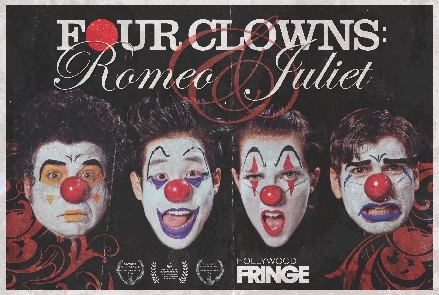
STUPID IS AS STUPID DOES
Our planet is overpopulated and sick. Wars are raging. Telecommunication is so rapid that we are losing the art of communication. Leaders and visionaries are being sacrificed for our own self-serving needs. Americans are in a permanent recession, yet we’re fatter than ever.
These are scary times. And what do people need most in scary times? Laughter. When we laugh, it soothes our jangled nerves. From stage (Shakespeare, Molière and Kaufman and Hart) to cinema (Chaplin, Sturges and Brooks), resonant humor occurs when the subject is taken seriously, the material is relevant to your audience, there is respect behind the jokes, and, hopefully, the material is rebellious in some way.
However, since the 1980s (and the dumbing down of America), comedy has largely become idiotic, cheap and vulgar – especially on TV and at the cinema. “That’s so stupid, it’s funny” kind of humor. Celebrities such as Will Ferrell, Jim Carrey and Adam Sandler and their character-based comedy were interesting at first, but now they’re boring retreads of themselves. Yet this very long trend of insulting humor is still raking it in at the box-office. Stupid sells and some of us ain’t laughing.
One of the most talked-about events at The Hollywood Fringe this year, Four Clowns: Romeo & Juliet eschews all the ingredients of great humor in a poorly written overkill of superfluously stupid filth and sex, yet audiences seem to love it. This creative, kooky, comical crew of contemporary commedia clowns – capable of high-minded hijinx – kick-it lowbrow instead.
Welcome to Gross-Out humor, which includes, but is not limited to: gratuitous sex, deliberately tasteless jokes, unnecessary belligerence and Schadenfreude. This style of comedy has made a mint for moviemakers because it’s inexpensive to produce and has a built-in “edgy” quality which seems to generate media attention with the 18-25 year-old market. Well, Gross-Out humor has found its niche on stage at the Hollywood Fringe Festival, which seems appropriate as so much of the Fringe is driven by testosterone. Younger audiences need to laugh as much as anybody else, so they slam back a few beers at Fringe Central and have some yucks about buttholes (at the expense of the Bard). Someone like me – in a generation from a galaxy far, far way – wishes he could guffaw at each genital-related joke too, but my mind simply refuses to get dumb and dumberer.
But wait. This show, the second from Four Clowns (hereafter, “4C”), has become a media and Fringe Phenomenon, winning three Fringe Awards and a Bitter Lemons nomination for “Most Outrageous Theatre.” It is not 4C that rankles me, per se (I am neither prig nor prude), but it stands to be the conflagrating linchpin wherein highly talented artists allow style to trump substance. (L.A. Weekly’s Bill Raden called 4C’s Romeo & Juliet “an excruciatingly witless 90 minutes of egregious, nonstop mugging and scatological excess.”) What upsets me is that other shows which lacked an essential core, Porter’s Macbeth (reviewed in the Fringe Wrap-up) and Ineffable also became popular happenings at the Fringe. All three tell us that the greatest clowning around in the world still needs a story in order to achieve catharsis.
With his first outing with the clowns, creator/director Jeremy Aluma was really on to something: in Four Clowns (starring 4C: the Sad Clown, the Angry Clown, the Mischievous Clown, and the Nervous Clown) took us through a sometimes side-splittingly funny journey through childhood, adolescence, adulthood and death. The sequence of scenes (and some improvisation) showcased the brilliant talent of the amazing jesters; they remained funny even as the show went astray. Nevertheless, the examination of humor as a way to face life’s unfairness became redundant without a through-story and its ultimate relevance lay simply in the ability to make us laugh.
Instead of upping the ante for Romeo & Juliet, Aluma, seven writers, crackerjack pianist Mario Granville and a team of four extremely talented farceurs (Alexis Jones, Kevin Klein, Raymond Lee, and Zachary Steel) took on the most famous story of all, but twisted Shakespeare’s text into an excuse for unjustified F-Bombs, unnecessary non-stop mania and unreasonable amounts of libido-driven crassness. Laughter may be the best medicine, but medicine can have toxic side effects, too: the show needed to breathe and take itself more seriously.
Why do I have a bone to pick with stupid? A 2005 New York Times article pointed out that American adults in general do not understand what molecules are (other than that they are really small). Fewer than a third can identify DNA as a key to heredity, only about 10 percent know what radiation is, and one adult in five thinks the Sun revolves around the Earth, an idea science had abandoned by the 17th century.
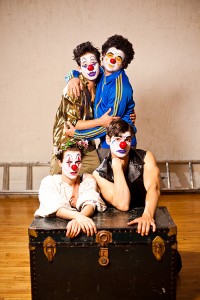 We know that high school test scores are abysmally low in comparison to other nations, so we change the grading curve on the tests. The U.S.A. scores the lowest in national average IQ among the developed countries of the world (98 to be exact), so we call the data controversial.
We know that high school test scores are abysmally low in comparison to other nations, so we change the grading curve on the tests. The U.S.A. scores the lowest in national average IQ among the developed countries of the world (98 to be exact), so we call the data controversial.
Ultimately, we don’t need tests and polls to know that stupidity is on the rise; still, we react with an inconsequential shoulder shrug, the same way we treat the melting of the polar ice caps: (“Oh, those poor polar bears. Anyone up for McDonalds?”). Between a decreased attention span and an increase of irrational fear, our priorities are out of whack in this country. We’re letting the computer and corporations think for us; hence the increase in stupidity, which could be eradicated if Americans got off their butts and actually experienced the world-at-large: William Clark – of Lewis and Clark – could not spell, yet the man’s travels fueled his brilliance and insight, and honed his keen observation.
Stupid humor may get a knee-slap or even win an award, but it still popularizes stupidity. My fear is that dim-witted theatre, cinema, and TV validates and perpetuates that stupidity. Are the American people aware of this trend? And if there were awareness, would anything be done about it? Let’s face it, being smart about the world takes effort and Americans are becoming lazier with each generation.
As 4C sets out on a nationwide tour of Fringe-y Festivals around the country, will they up the ante and attempt to revolutionize theatre (possibly alienating a lucrative audience) or simply bask in their glory? (The web site Bitter Lemons is also allowing them to journal their upcoming Fringe excursions.)
Could this popularization of witlessness be contributing to our lack of vision in this country? Why are the Kardashians, Sarah Palin and Spider-Man making a mint at our expense? And what about vision in the theatre? Why are the uber-talented 4C artists simply copying a formula from the movies, instead of using vision to revolutionize theatre? What about the art of storytelling? Are these bright, promising artists following fame and fortune or their hearts? Are they letting the audience dictate art?
When I asked Mr. Aluma what the vision for his clownfest is, he smiled wryly, “Las Vegas.”
Suddenly, it all makes sense.
photos by Mustafa Sayed and Mariah Tauger
Four Clowns: Romeo & Juliet
part of the Hollywood Fringe Festival
ArtWorks Theatre & Studios
scheduled to end on July 9, 2011
on tour at Festivals through September 17, 2011
for more information, visit Four Clowns
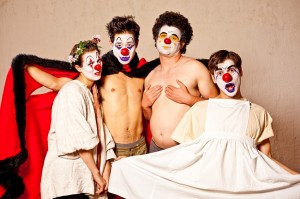
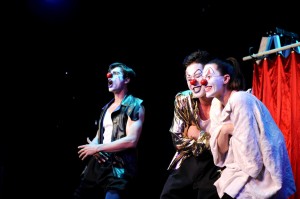
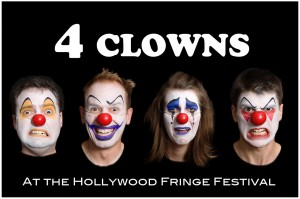

{ 1 comment… read it below or add one }
Hi Tony==My respect for you grows with your talented ways of expressing your opinions. Fight On..
p.s. We have some opportunities for you to consider whenever you come to Chicago.